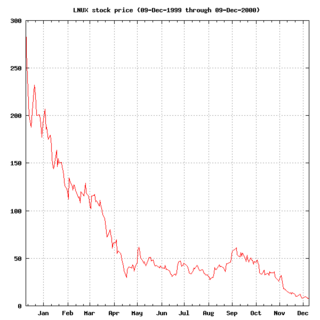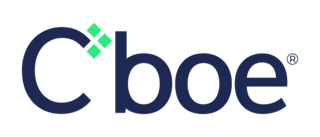
The Nasdaq Stock Market is an American stock exchange based in New York City. It is the most active stock trading venue in the US by volume, and ranked second on the list of stock exchanges by market capitalization of shares traded, behind the New York Stock Exchange. The exchange platform is owned by Nasdaq, Inc., which also owns the Nasdaq Nordic stock market network and several U.S.-based stock and options exchanges.

The New York Stock Exchange is an American stock exchange in the Financial District of Lower Manhattan in New York City. It is the largest stock exchange in the world by market capitalization.
The National Stock Exchange (NSX) is an electronic stock exchange based in Jersey City, New Jersey. It was founded March 1885 in Cincinnati, Ohio, as the Cincinnati Stock Exchange.

In finance, market depth is a real-time list displaying the quantity to be sold versus unit price. The list is organized by price level and is reflective of real-time market activity. Mathematically, it is the size of an order needed to move the market price by a given amount. If the market is deep, a large order is needed to change the price.

In finance, market data is price and other related data for a financial instrument reported by a trading venue such as a stock exchange. Market data allows traders and investors to know the latest price and see historical trends for instruments such as equities, fixed-income products, derivatives, and currencies.

Options Clearing Corporation (OCC) is a United States clearing house based in Chicago. It specializes in equity derivatives clearing, providing central counterparty (CCP) clearing and settlement services to 16 exchanges. Started by Wayne Luthringshausen and carried on by Michael Cahill. Its instruments include options, financial and commodity futures, security futures, and securities lending transactions.
A national market system plan is a structured method of transmitting securities transactions in real-time. In the United States, national market systems are governed by section 11A of the Securities Exchange Act of 1934.
The Consolidated Tape Association (CTA) oversees the Securities Information Processor that disseminates real-time trade and quote information in New York Stock Exchange (NYSE) and American Stock Exchange (AMEX) listed securities. It is currently chaired by Emily Kasparov of the Chicago Stock Exchange, the first woman and the youngest chair elected to the position.
The Consolidated Quotation System (CQS) is the electronic service that provides quotation information for stock traded on the American Stock Exchange, New York Stock Exchange, and other regional stock exchanges in the United States and also includes issues traded by FINRA member firms in the third market. Nasdaq processes this data and provides it to its subscribers as the Composite Quotation Service. The initials CQS may be used either for the exchange system or the NASDAQ service.
The Consolidated Tape System (CTS) is the electronic service, introduced in April 1976, that provides last sale and trade data for issues admitted to dealings on the American Stock Exchange, New York Stock Exchange, and U.S. regional stock exchanges.
The Options Price Reporting Authority (OPRA) oversees the Securities Information Processor (SIP) that provides last sale information and current options quotations from a committee of participant exchanges. In turn, this committee is designated as the Options Price Reporting Authority.
The National Market System (NMS) is a regulatory mechanism that governs the operations of securities trading in the United States. Its primary focus is ensuring transparency and full disclosure regarding stock price quotations and trade executions. It was initiated in 1975, when, in the Securities Acts Amendments of 1975, Congress directed the Securities and Exchange Commission (SEC) to use its authority to facilitate the establishment of a national market system. The system has been updated periodically, for example with the Regulation NMS in 2005 which took into account technological innovations and other market changes.

BATS Global Markets is a global stock exchange operator founded in Lenexa, Kansas, with additional offices in London, New York, Chicago, and Singapore. BATS was founded in June 2005, became operator of a licensed U.S. stock exchange in 2008 and opened its pan-European stock market in October 2008. As of February 2016, it operated four U.S. stock exchanges, two U.S. equity options exchanges, the pan-European stock market, and a global market for the trading of foreign exchange products. BATS was acquired by Cboe Global Markets in 2017.
Direct Edge was a stock exchange operating two separate platforms, EDGA Exchange and EDGX Exchange. It was based in Jersey City, New Jersey.

Investors Exchange (IEX) is a stock exchange in the United States. It was founded in 2012 in order to mitigate the effects of high-frequency trading. IEX was launched as a national securities exchange in September 2016. On October 24, 2017, it received regulatory approval from the U.S. Securities and Exchange Commission (SEC) to list companies. IEX listed its first public company, Interactive Brokers, on October 5, 2018. The exchange said that companies would be able to list for free for the first five years, before a flat annual rate of $50,000. On September 23, 2019, it announced it was leaving its listing business.

Cboe Canada is a stock exchange based in Toronto. Part of the Cboe Global Markets network, the exchange has over 260 listings for public companies, exchange-traded funds (ETFs), Canadian Depositary Receipts (CDRs), Special Purpose Acquisition Companies (SPACs), and closed-end funds. Cboe Canada handles 15% of the volume traded across Canadian marketplaces, including 20% of Canadian ETF transactions.

Securities market participants in the United States include corporations and governments issuing securities, persons and corporations buying and selling a security, the broker-dealers and exchanges which facilitate such trading, banks which safe keep assets, and regulators who monitor the markets' activities. Investors buy and sell through broker-dealers and have their assets retained by either their executing broker-dealer, a custodian bank or a prime broker. These transactions take place in the environment of equity and equity options exchanges, regulated by the U.S. Securities and Exchange Commission (SEC), or derivative exchanges, regulated by the Commodity Futures Trading Commission (CFTC). For transactions involving stocks and bonds, transfer agents assure that the ownership in each transaction is properly assigned to and held on behalf of each investor.
For three hours on August 22, 2013, trading was halted on the Nasdaq Stock Market. Trading on the exchange stopped at 12:14 pm and resumed at 3:25 pm, with 35 minutes left of trading for the day. One week after the trading halt NASDAQ OMX credited the freeze to an overloading of the Securities Information Processor (SIP) caused by reconnection issues with the New York Stock Exchange Arca. The freeze received substantial media coverage and generated discussions on the security of increasingly technologically advanced stock exchanges. The event coined the term "flash freeze" following the earlier "flash crash" on May 6, 2010.
A securities information processor (SIP) is a part of the infrastructure of public market data providers in the United States that process, consolidate, and disseminate quotes and trade data from different US securities exchanges and market centers. An important purpose of the SIPs for US securities is to publish the prevailing National Best Bid Offer (NBBO).








